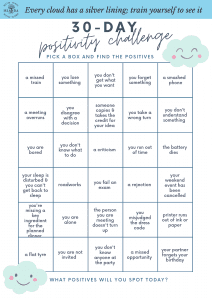Are you stuck in a downward spiral of negative thoughts or stuck in a negative thinking loop? Why not try this simple and easy idea…
Here is a pdf that you can download with ideas for 30 days to create a habit of focussing on the positives. Have some fun – come up with your own ideas to keep it going:
And here’s what it’s all about…
The last year has been a challenge for many, with restrictions limiting our social interactions as well as halting our plans for our lives, careers and personal pursuits. Whilst some have thrived or found useful coping strategies, others have found this more difficult. With insufficient opportunities to balance our own thinking patterns and too much time with a limited number of people with their own patterns has lead to some of us getting stuck in thinking patterns that have become increasingly negative and unhelpful.
Our brains are primed for survival, leading us to have a negative bias, constantly alert for potential threats. In a world where our survival is no longer at stake, this over-zealous functionality ends up causes unnecessary distress, anxiety and depression. This outdated operating system needs updating for today’s world. Evolution takes too long so we need some techniques to accelerate this update so we can navigate a world that is far more complex and volatile than our brains are designed to cope with.
Common negative thinking patterns
The Over-thinker – this pattern involves ruminating over and over in a thinking loop, considering all scenarios and weighing up all possibilities. Some of the downsides of this pattern is inappropriate perfectionism and ‘paralysis by analysis’ that could lead to a delay in making a decision or no decision being made – remember no action is also a decision even though it might not feel like one.
For example:
You need to decide on which course to take, an offer is open for a week. You start thinking – Should I sign up? What if I don’t like it? What if it doesn’t do all that I need? What if I spend too much and then I can’t afford or don’t have time, for the other courses I need? etc There are so many courses available and each does something slightly different – you end up doing nothing and making no progress – remember: no action is still a choice.
TIP: In complex or time poor situations, follow your intuition and instincts
The Fantasy Ladder – this pattern involves taking a fact, embellishing that fact, turning the embellishment into fiction and then fantasising about the consequences from the manifestation of those fictional scenarios.
For example:
- Fact: They didn’t return my call
- Faction: They don’t want to talk to me
- Fiction: They think I am not good enough for the job
- Fantasy: I will never get a job
TIP: Challenge this pattern by keeping to the facts. Ask for clarification, test any hypotheses, involve others to balance thoughts.
The Negative Self-Talker – this pattern involves an over-emphasis on spotting all the negative cues and none of the positive cues. When thinking through options, this person will critique the options and talk themselves out of ideas before exploring them fully. This will limit trying new things, embracing change or adopting creative solutions.
For example:
You just pass your exam. You focus on the fact that it was only just a pass, you might look stupid, you might fail next time, what if you can’t understand the next module, everyone else is better than you etc
TIP: Challenge this pattern by creating a habit of looking for the positives, silver lining and opportunities
What easy exercise can you do to train the positivity muscle?
Whilst the above tips work, doing them can be difficult if the person is a negative downward spiral, resistant to try new practises, believing that nothing will work. For example, another useful practise for positivity is keeping a gratitude journal. However, if you are in a negative state of mind you may find it difficult to find anything to be grateful for, or you put the same thing everyday, reinforcing that you have little to be grateful for and therefore justifying your negative mood even more.
If this resonates with you, or you recognise resistance in someone you are supporting, rather than pushing them to do the techniques that feel overwhelming to them, find something really small and easy that they can do daily and consistently, so that they can start to train their positivity muscle one thought at a time.
For example, I am supporting someone that is struggling at the moment – everyday I send them a good morning text with a simple question such as ‘what 3 positives can you think of if you had a flat tyre?’. This abstract question, is removed from their life and current experiences, yet it provides an ‘exercise’ to train their brain to look for positives. And what’s more, if or when, they experience a similar daily challenge in the future they have already come up with some positives as to why it’s not such a bad thing to happen!
If you are struggling, or you are supporting someone who is, create this habit:
- Be kind
- Acknowledge the negative thoughts & feelings – the thoughts and feelings are real
- Encourage small steps
Remember, this moment will pass.
And if you need help, reach out. For inspiration or support please connect with me, comment or get in touch at [email protected]. Take care.

